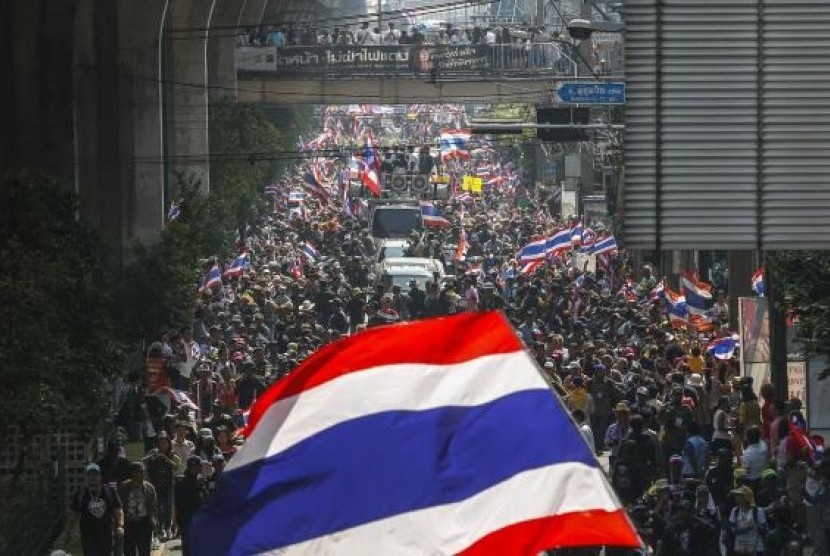REPUBLIKA.CO.ID, BANGKOK -- Thai anti-government protesters who have been camped out in north Bangkok packed their tents and marched downtown on Monday as they consolidated efforts to topple Prime Minister Yingluck Shinawatra, a day after a disrupted general election.
Some joined protest leader Suthep Thaugsuban on foot and others followed in cars and six-wheel trucks as Thailand's long-running political conflict showed no sign of ending.
Others surrounded a government office in north Bangkok where Yingluck and two senior ministers had been holding a meeting and cut through a barbed-wire fence. They later dispersed.
The protesters closed camps at two of the seven big intersections that they have blockaded since mid-January, at Victory Monument and Lat Phrao, and headed for the fringes of the central oasis of Lumpini Park.
A third camp run by an allied group at a big government administrative complex may also be closed.
Suthep said on Sunday this was being done out of safety concerns, but it could also be because their numbers are dwindling. Reuters put the number of marchers at about 3,000.
"Suthep's movement is now crumbling, but it still has powerful unseen backers," said Chris Baker, a historian and prominent Thailand scholar.
"Backdoor negotiations are needed because both sides will avoid any direct confrontation in public view. The business lobby should revive its efforts to play the intermediary role."
Suthep's supporters on the route showed no sign of crumbling, waving flags and handing over money.
The demonstrators blocked balloting in a fifth of the country's constituencies on Sunday, saying Yingluck must resign and make way for an appointed "people's council" to overhaul a political system they say has been taken hostage by her billionaire brother and former premier, Thaksin Shinawatra.
The election, boycotted by the main opposition party, is almost certain to return Yingluck to power and, with voting passing off peacefully across the north and northeast, Yingluck's supporters will no doubt claim a legitimate mandate.
But the vote is unlikely to change the dysfunctional status quo in a country popular with tourists and investors yet blighted by eight years of polarisation and turmoil, pitting the Bangkok-based middle class and royalist establishment against the mostly poor, rural supporters of the Shinawatras.
The protesters have rallied in Bangkok since November to try to oust Yingluck. They wanted electoral rules rewritten before any election and have vowed to keep up the protests.
Giving provisional data on Monday, the Election Commission said 20.4 million people cast their vote on Sunday, just under 46 percent of the 44.6 million eligible voters in 68 of 77 provinces. In the other nine provinces, no voting was possible.
Voting was disrupted in 18 percent of constituencies, 67 out of 375, the Commission said, revising data given Sunday.
It is unclear when voting will be held there and it could be weeks before parliamentary seats are filled, so Yingluck will remain a caretaker premier with no policy authority, unable to approve any new government spending.


